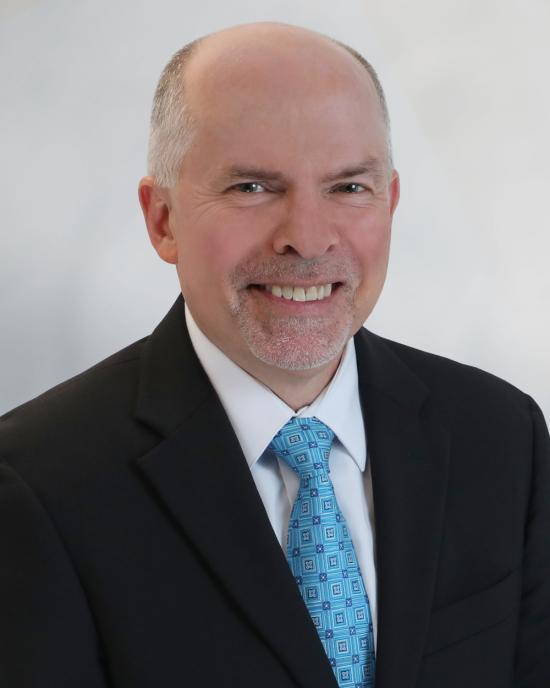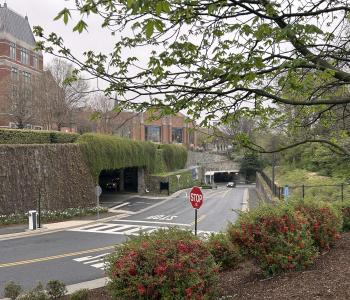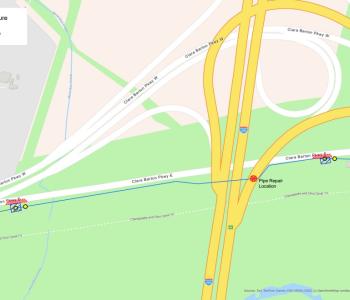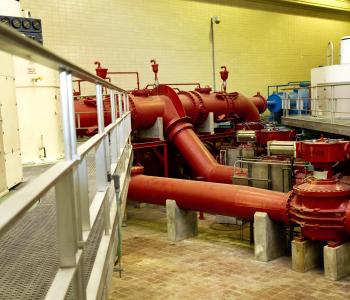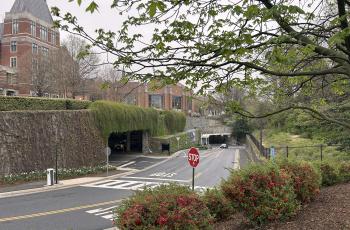WASA is fulfilling its Community Water Pledge
The District of Columbia Water and Sewer Authority (WASA) is pleased to announce it is meeting the mandates of the Community Water pledge it issued last June.
Within the past week, WASA reported that lead levels in the Districts water supply are decreasing. Ten percent of our compliance samples are still above the EPA action level of 15 ppb, so WASA is still considered to be in non-compliance.
But the last six months of testing show compliance samples averaging 19.2 ppb. During our last round of testing from October through the end of December, the average lead concentration fell to 10.6 ppb, which is below the EPA action level of 15 ppb.
Were making progress. The recent decline in lead levels is being attributed to the addition of orthophosphate to the Districts water supply by the U.S. Army Corps of Engineers Washington Aqueduct last August. However, orthophosphate, a corrosion inhibitor which prevents lead from leaching into drinking water from lead service pipes, could take up to a year or more to provide maximum protection.
Identifying a solution to elevated lead levels in the tap water of some District homes has been an integral part of our Community Water Pledge. But weve also made a promise to provide our citizens with world-class customer service.
The following info explains how.
WASA has lived up to its Community Water Pledge by:
-- Accelerating the replacement of all public space lead service lines in the District.
WASA, which plans to replace all lead service lines in public space by the year 2010, has the largest lead line replacement program in the country. We are required to replace seven percent of the citys lead service line pipes in public space annually until 90 percent of the water samples fall below the lead action level of 15 parts per billion.
But WASA has gone beyond that. Weve accelerated our normal construction schedule and are on track to replace a total of 2,500 public space service lines by the end of 2005. WASA also has commitments from 600 homeowners who want the lead service lines on their private property replaced.
-- Working in partnership with a local financial institution and District government agencies to create loan programs to help finance the replacement of private property service lines.
WASA has partnered with Wachovia, a national bank with a strong commitment to the local community, to provide special interest rate loans to residents eligible to get their private service lines replaced.
WASA has also partnered with the D.C. Department of Housing and Community Development to provide replacement grants to low-income families in our service area. Any resident, interested in obtaining a service line replacement loan should visit a Wachovia branch in the District. More info on DHCDs grant program is available at 202-442-7154 or at www.dhcdwaterlines@dc.gov.
Through its partnerships with three major filter manufacturers, WASA also distributed more than 20,000 filtration systems to addresses with lead service lines.
-- Working closely with WASA stakeholders, including elected officials, faith-based, community and civic organizations to ensure our communication is clear and reaches target audiences.
Through its Lead Services Hotline (202-787-2732 and wqp2003@dcwasa.com). WASA has provided vital information about its lead reduction efforts. Our hotline workers distributed lead testing kits, arranged for water sample pick-ups and provided information on lead service line replacement including payment options, loan programs and grant information. It also has a schedule listing dates for block service line replacements. Since last February, our hotline has responded to more than 65,000 lead-related calls. To provide more efficient service and eliminate wait times, Hotlines hours were extended and more staff added.
Last year, WASA distributed more than 25,000 water sample tests kits to customers with lead service lines and paid to have these samples tested. WASA continues to urge residents to return their kits as soon as possible.
WASA found that the water it delivers to schools throughout the district is safe. Some of the fixtures (faucets, water fountains) found to have elevated lead levels were replaced.
WASA hosted or gave lead-related presentations to more than 40 neighborhood, community and civic groups. We have also provided lead information and materials to city libraries, community centers and other sites in the District.
-- Improving communications with our customers:
WASA has sent letters to every residence in the District discussing the problem and more detailed letters in English and Spanish and other languages to homes with known lead service lines. As lead service line replacement continues in public spaces, residents will also get a letter explaining the excavation and restoration process, lead line replacement costs and extended payment options. So far, WASA has also mailed out more than 4,000 of these informational packets to neighborhoods targeted for replacement. Nearly 800 property owners have responded, including the 600 homeowners getting their private lines replaced. WASA officials have also held numerous media briefings.
Weve also produced a number of brochures and fact sheets that outline the problem and discuss possible solutions. The Authority has also used Whats On Tap, the customer newsletter it sends out with its monthly bills, to address the issue and give precautions. The lead-related info on our website, www.dcwasa.com, has been substantially beefed up.
-- Strengthening our partnership with the D.C. Department of Health to address any health concerns of D.C. residents regarding lead leaching.
WASA assisted the District of Columbia Health Department with its blood lead level testing program in 2004 and with the development of tracking system for blood lead level test results. Through this relationship, WASA has been informed that there is no evidence of a direct link between elevated blood levels and lead levels in the tap water.
-- Working with the D.C. Department of Health and experts from the George Washington Universitys School of Public Health to improve our ability to communicate with residents regarding local research on the health effects of lead exposure.
WASA conducts regular meetings with EPA, the Washington Aqueduct, the Department of Health and other experts to monitor all aspects of water chemistry, including the addition of orthophosphate to the water supply.
Last summer, WASA and GW University convened a two-day national symposium attended by more than 50 water industry experts -including health professionals and regulators and citizen advocacy groups. They discussed the Districts lead experience, explored the intent and implementation of the Lead and Copper Rule and to framed future policy discussions on the issue.
The Authority, federal regulators, policymakers and the public are learning from the Districts experience how the Lead and Copper Rule plays itself out in real life. We have learned that 100 percent adherence to the Lead and Copper Rule is insufficient to meet the expectations of customers.
WASAs lead service line replacement program demonstrates our commitment to prevent lead-related problems in the future. Our Community Water Pledge demonstrates our commitment to effectively work with our customers to address their concerns.
Providing the highest quality product and service to our customers has always been WASAs bottom line.
